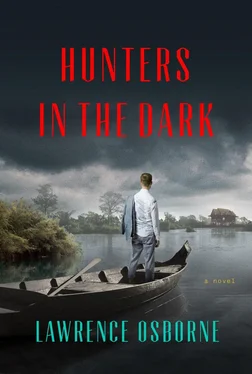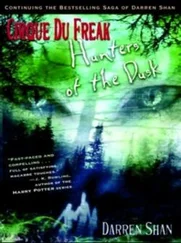Now the American was dead, and where was the Englishman? No one would ever give up their passport willingly.
The American and his girl — he had seen them somewhere. At one of the bars on the water, maybe, long ago. A man spinning in his happiness in expensive clothes. He remembered the clothes, as one does in this country. A well-tailored man stands out.
“They all die like that,” he said aloud. Casually, as if it were nothing.
He looked at his watch, and as he did so, the phone rang and it was the owner of a riverside café saying there was a body near the piers under the temple at a place he knew a mile downriver. He drove there calmly. The body had become entangled in the beams of the jetty and hung there while a swarm of construction workers fussed around trying to disentangle it. Finally they succeeded and the limp rag doll was brought to terra firma. The American’s skin had changed color and something had taken a bite out of his left shin. They laid him on the mudflat and Davuth stood there and took notes and asked everyone to clear off and go stand farther away. Then he had an ambulance called and the body was transferred to the police station. There it was laid in the garage while a few photographs were taken and the coroner came and he and Davuth talked alone in the field behind the station. The man was an old collaborator and they saw eye to eye in these matters. Autopsies were obligatory but sometimes they were slyly overlooked. The man observed that the American seemed to have suffered damage to the head but it might have happened in the water. Indeed it might, Davuth agreed, and they had a smoke and talked about other things and soon they walked back to the garage and Davuth suggested they cremate the body that day and have done with it. The coroner was in agreement. Another barang who had gotten high and thrown himself into the river in a moment of ecstasy or despair — for were those two states not often one and the same? They would quietly split any proceeds between them and life would flow on and the usual busybody from the embassy would drive up and ask about those same belongings. “We couldn’t find anything,” Davuth would say and life, yet again, would flow on nowhere toward its mysterious and nihilistic destination.
—
Late in the afternoon he took the body to a wat and had it cremated by the monks he knew. They said prayers and he gave them a small donation out of the money he’d made and then he waited patiently while the ashes were packaged and he asked them to keep them there for a week while the paperwork went through. He had his customary cheroot and walked back out into the early evening and he saw that at the top of the hill the young monks were lounging about outside their dorms and looking down — as if at a sport — at the bridge that was being built across the river. He went up there out of curiosity and sat on a wall and looked at the same thing. The half-built bridge, the curve of the river. Women washed clothes in the shallows, their long hair unfurled. A horse stood there with them, its head dipped toward the water, and young boys swam in a deeper pool near the bridge. The workers were drifting away at their day’s end. Some had built fires and were cooking fish in the open. He looked up at the huge trees that towered above the dorms and one of the boy monks offered to show him something unusual for a little tip.
They walked in among the trees and it was as if night had arrived here first, bringing with it the stirred nocturnal insects and the stillness. Yet the sky was blue; there was no rain. The boy took him to the densest part of the trees and made him stand still and look up and then he abruptly clapped his hands and there was a generalized stirring in the treetops and, as if with one will, the thousands of bats hanging there erupted into life and rose into the air with a noise like locusts.
The boy turned to see his reaction and the policeman rolled back on his heels for a moment and a dark superstition came into his mind and wrecked everything there.
But then he let out a laugh and shook his head. The monks were watching them and their faces, by contrast, were immensely grave. To them it was not quite a joke or a stunt. Davuth controlled his fear as the bats then came whizzing down into the lower parts in a crazed confusion and when they had finally calmed he strode back out to the embankment and walked down to his car with something resolved in his mind. He drove back to his house and saw that his daughter had returned from school. She was seated at the kitchen table doing her schoolwork. Calm and self-contained, like many girls at that age.
He kissed her forehead and she looked up for a moment and he passed into his room where the safe was and closed the door. He took a quick cold shower, then opened the safe and looked at the money and then at the passport of the Englishman. It was not avarice he felt as he went through the possibilities that had now opened before him. Something told him that a road lay ahead of him and that the road was made for him and no one else. The Englishman was also on the road and the money Davuth had inherited was not the end of the money that could be had. That barang was now a nonperson, a man who had ceased to exist. Did that not make him uniquely vulnerable? He, Davuth, on the other hand, would be invulnerable when hunting him down. The idea gave him a twisted pleasure.
Then he locked everything in the safe and went into the kitchen and made his daughter dinner. They had a housekeeper who could come whenever needed and the old woman often looked after the girl when he was away on cases. He would call her in the morning. For now he made fried rice heavily sauced with prahok, the fermented fish paste. His daughter looked up and watched him with big cool skeptical eyes. She sensed everything about him.
“What did you do at school today?” he asked.
She told him, unconvincingly.
“I might be going away for a few days,” he said as he sat down with the rice and the prahok . “It’s just another job.”
“Are you looking for a bad man?”
“Not really. It’s just a job.”
“But is it a bad man?”
He shrugged. “What is a bad man?”
They ate in silence and he glanced through her exercise book. It was filled with figures of algebra, simple calculations, diagrams he could not understand. His own schooling had been interrupted by the Revolution and never resumed, but those abstractions, he always felt, were reprieves from the relentless realities of life, small delusions that paid no dividends. They had never been of any use to him, but later they would be of use to her. Education was a magic that some could use.
“Never mind about bad men,” he said, and stroked her hair. “You don’t need to think about that.”
He closed the book and gave her permission to watch television for a while. As she did so he took a beer from the fridge and went out into his little garden. He sat there looking at the clear moon and its portentous halo — a sign, surely, of ominous things to come. He felt the pressing smallness and meanness of that garden now, the evidence that he was just scraping by for all the perks he creamed from his profession. It was never enough. He wanted a house with a swimming pool and an iron gate, many things that did not come easily to lowly men. He would have to retire soon and then his slowly augmenting fund for his daughter would come to a standstill. It was not far off and he had to make the most of his remaining days of corruption and opportunity and profit. They were numbered like the fingers of his hands and as his commander had taught him to do long ago, one had to chop those fingers off one by one without thinking too much about the pain.
He thought about this later, too, when he was alone watching DVDs after his daughter had gone to bed. An HBO series called Vikings, which he had grown fond of. The Vikings, barangs of the far north in a distant time, went about with their axes assailing the English, cutting into their flesh with pleasure. Had it really been like that, the killing days? The men with blades smiling like the Vikings — seemingly all the time — and wading through fields and villages of wattle with an intention that was, after all, inscrutable. How they hated the English Christians. They loved to spit on their crucifixes. It was fascinating — the pleasure of the desecration. Did they really enjoy the releasing of blood and the insolent disturbance of Dhamma?
Читать дальше












